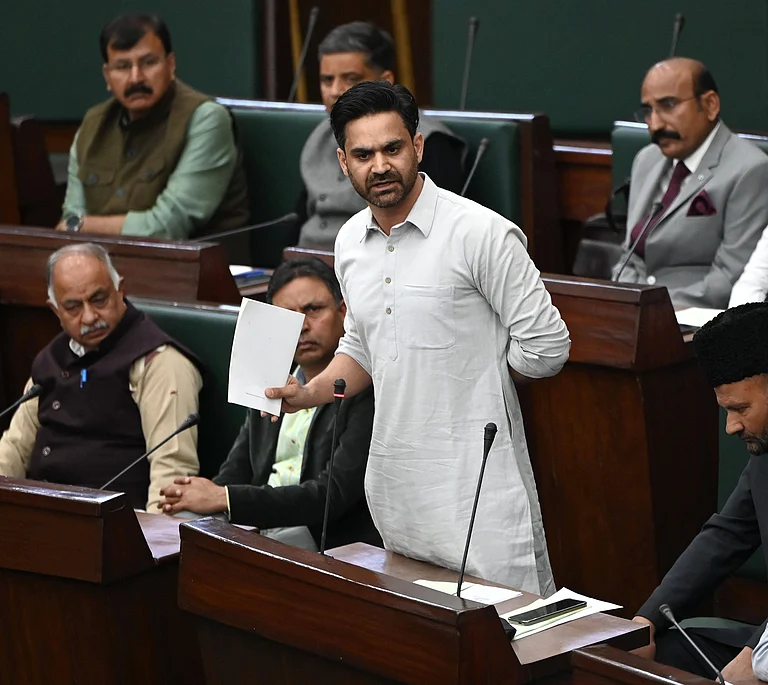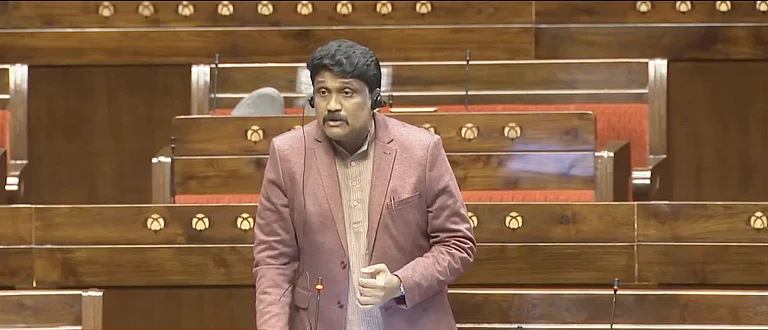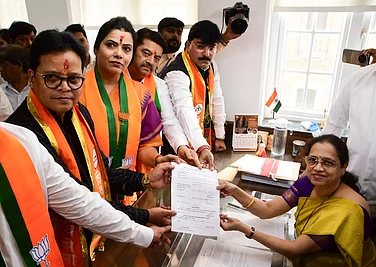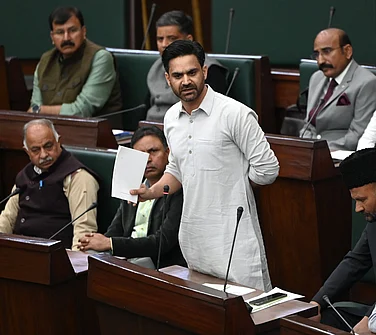INDER Kumar Gujral takes great pride in his pacifist style; he claims never to have fought with his wife in a half-century of marriage. Mild-mannered, non-controversial, inoffensive, he is ever the gentleman. Something of a wimp? Perhaps, says former prime minister Chandra Shekhar, but holds that to be a virtue in the present circumstances. "He is not majboot (firm)...but that's good in someone who is to head a coalition."
The exigencies of coalition politics pushed the lightweight, Left-leaning former Congressman within reach of prime ministership. His squeaky-clean image helped, as did the fact that he has made no political enemies—or friends. Neither casteist, parochial nor communal, he has wide acceptability.
A scholar and lover of Urdu poetry (his favourite is Faiz, whom he knew), Gujral, 78, is more at home at the India Centre than the rough and tumble of Indian politics. Detractors describe him as a "cocktail politician (although he doesn't drink)", who substitutes a good table for serious work.
As foreign minister, he attracted both accolades and flak. Critics say he lacks a global perspective; his anachronistic Cold War mindset and Communist background engendered a regional focus at the cost of wider relations. India's failure to secure a seat on the UN Security Council— Gujral passed that off as the price for opposing CTBT—is cited as example. His earlier term, under V.P. Singh, is best remembered for his post-war visit to Iraq, where he was photographed hugging Saddam Hussein. "The Kuwaitis didn't speak to us for years," recalls a bureaucrat. His 'Gujral doctrine' is equally controversial; dubbed progressive by some and spineless by others: "In essence, we must make amends for our size with unilateral concessions and a saintly attitude to our neighbours." But, as one critic says, he is silent on China—perhaps simply because the size ratio is inversed.
Born in Jhelum, now in Pakistan, he studied in Lahore and took to both Marxism and the freedom movement early. His father, Lala Avtar Narain, was a member of the Constituent Assembly. A principled and austere man, he ran a home for destitute women in Jalandhar after Partition. The young Gujral went into business with his Delhiite cousins. That didn't last, as Sucheta Kripalani weaned him from Marxism to active Congress politics. His artist brother, Satish, introduced him to Nehru.
Gujral became a member and then vice-president of the New Delhi Municipal Committee. Indira Gandhi elevated him to minister status. As housing minister, he set aside funds for beautification of buildings. It is to him that Delhi owes the murals adorning government edifices, as well as its master plan. Information & Broadcasting minister when Emergency was declared, he couldn't get along with the brash Sanjay and was shunted to Moscow, where he stayed until 1980, growing a Leninesque beard. That he did not quit is not the least of the criticism against him; the 11-year-old who stoically bore British lathis grew up to put up with Mrs Gandhi's excesses.
Back from Moscow, he busied himself hosting salons. The Punjab Group, for instance, brought together intellectuals and politicians, both Akali and Congress. "He was the common factor, the key which opened many locks," says journalist Kuldip Nayar. Gujral returned to active politics with the birth of the Jan Morcha and subsequently won his first Lok Sabha election from Jalandhar.
The former Marxist lives in considerable affluence in upmarket Maharani Bagh. The profitability of Span, the garment export firm run by his son, Naresh, can be gauged from his recent purchase of a house on Delhi's ultra-expensive Amrita Sher Gill Marg.
Gujral is charged with nepotism and playing favourites with the bureaucracy, a section of which sees him as self-serving. The suave exterior masks an authoritarian tendency, they say. His penchant for sermonising gets him into trouble; he disagreed publicly with the German foreign minister and was thoroughly snubbed by an East European diplomat when they argued on NAM. But Gujral packages himself beautifully to the media. An official points out that he took more journalists abroad with him than the prime minister, courtesy the External Publicity Division's discretionary fund.
To the criticism that he lacks a mass base and, therefore, political legitimacy, Nayar quotes an old Urdu couplet: " Jamhooriat woh tarz-e-hukumat hai ki jisme bande gine jaate hai, tole nahi jaate (democracy is that way of government where people are counted, not weighed)". Gujral, the veteran journalist adds, is "one of those people who deserve to be weighed".


























